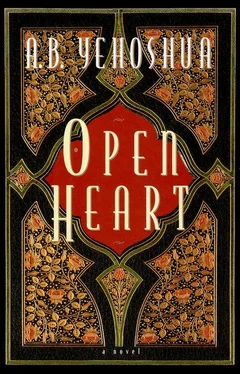A. Yehoshua - Open Heart
Здесь есть возможность читать онлайн «A. Yehoshua - Open Heart» весь текст электронной книги совершенно бесплатно (целиком полную версию без сокращений). В некоторых случаях можно слушать аудио, скачать через торрент в формате fb2 и присутствует краткое содержание. Год выпуска: 2014, Издательство: Peter Halban, Жанр: Современная проза, на английском языке. Описание произведения, (предисловие) а так же отзывы посетителей доступны на портале библиотеки ЛибКат.
- Название:Open Heart
- Автор:
- Издательство:Peter Halban
- Жанр:
- Год:2014
- ISBN:нет данных
- Рейтинг книги:3 / 5. Голосов: 1
-
Избранное:Добавить в избранное
- Отзывы:
-
Ваша оценка:
- 60
- 1
- 2
- 3
- 4
- 5
Open Heart: краткое содержание, описание и аннотация
Предлагаем к чтению аннотацию, описание, краткое содержание или предисловие (зависит от того, что написал сам автор книги «Open Heart»). Если вы не нашли необходимую информацию о книге — напишите в комментариях, мы постараемся отыскать её.
Open Heart — читать онлайн бесплатно полную книгу (весь текст) целиком
Ниже представлен текст книги, разбитый по страницам. Система сохранения места последней прочитанной страницы, позволяет с удобством читать онлайн бесплатно книгу «Open Heart», без необходимости каждый раз заново искать на чём Вы остановились. Поставьте закладку, и сможете в любой момент перейти на страницу, на которой закончили чтение.
Интервал:
Закладка:
I called my parents to hear how they were getting on with Shivi. Everything was going smoothly, although my father had had to come home early from work to help my mother, who sounded, despite her calm, reassuring voice, rather strained. I had already noticed that ever since the severe influenza she had come down with in Scotland, she seemed frailer, and I promised myself that as soon as Lazar recovered and Michaela returned to Israel, I would go up to Jerusalem for a day or two to check up on her health. In any case, my parents did not disguise their profound enjoyment of their granddaughter, who had already demonstrated a number of cute tricks. I said good-bye to Amnon and the two English girls, who were still eating the meal they had prepared, and set off for the hospital. It was six o’clock. First I went to intensive care unit to announce my arrival. I took my beeper and turned it on, and then I went up to the ninth floor to internal medicine to look for Lazar. He wasn’t hard to find. At the end of the corridor I saw a few doctors and members of the administrative staff, who evidently couldn’t wait to visit the recovering director, and peals of happy laughter, immediately recognizable as Dori’s, rang out in the distance. I turned back, not wanting to be part of the crowd, and only returned two hours later. Now it was quieter. Dori was sitting on a bench in the corridor. Their son was sitting on one side of her, and her mother on the other.
I greeted them all and asked how the patient was feeling. Dori went very red and for a moment she was speechless, as if she were in love with me too, but the granny, who was delighted to see me, said that her son-in-law was doing well, and Professor Hishin, who had changed his dressings in the morning, was very pleased with the rate of his recovery. Dori regained her composure and smiled brightly and introduced her son to me. He nodded indifferently, no doubt sick and tired of the constant introductions to the stream of visitors making the pilgrimage to the ninth floor. I reminded him that we had already met for a moment almost two years before, when I had gone to their house on that first evening to talk about the trip to India. He raised his eyes to examine me. “Yes, it’s the famous Dr. Rubin,” repeated his mother, avoiding the use of my first name. They were all waiting outside, it seemed, because Professor Levine was examining the patient and changing his dressings. Although I knew that my intrusion would annoy Levine, I couldn’t resist the opportunity to get a look at the place where I had seen the chest being rapidly sawed open, and I knocked lightly on the door and went inside. Professor Levine, who was busy smearing iodine on the long line of brown stitches running down Lazar’s chest, glared at me angrily as I entered the room, which surprised me with its size, the stunning view from its window, and the multitude of flowers filling it. But the warmth of Lazar’s greeting prevented him from objecting aloud to my entry. “Where did you disappear to?” cried Lazar — his eternal cry to me, which had first been sounded in India, although it was they, not I, who had disappeared in the train station at New Delhi. “I’m right here,” I said with a smile, “I’ve been here all the time.” I asked him how he was feeling and he immediately said that he was feeling fine, as if he wanted to please me too, along with the rest of the doctors who had participated in his operation, at which for some reason he insisted on thinking I had played an active role. Levine, who had finished smearing the stitches with ointment, now began to bandage the wound with the unpracticed hands of the head of an internal medicine department. I picked up the patient’s charts, which were pinned together at the foot of the bed, and looked at the temperature, the blood pressure, the EKG, and the results of the blood and urine tests which had been run on Lazar over the past few days. Maybe the fact that I had taken part in the surgery gave me the nerve to draw Levine’s attention to the acute irregularities to be seen in a number of the EKG strips, which showed premature ventricular beats, sometimes even in couplets or triplets, whose origin was unclear to me. “Isn’t there a danger of ventricular tachycardia here?” I asked. At first Levine tried to ignore my question, but since I stubbornly repeated it, he decided to say something, perhaps in order not to worry Lazar. “Yes, Dr. Rubin,” he said rapidly and rudely. “We saw that too. We’re not blind, you know, and we’re perfectly capable of drawing our own conclusions. We don’t need every doctor in the hospital sticking his nose in here, even if the patient is the director. No doubt you have work to do elsewhere. Why don’t you get back to it and let us worry about Mr. Lazar?”
But I couldn’t stop worrying, and four hours later, late at night, I knew that I would have no rest until I went up again to the ninth floor, already in darkness except for the nurses’ station, which, in my doctor’s gown, I had no problems passing. I stopped outside the closed door of Lazar’s room and listened, but all I could hear was the television. I knocked lightly, careful not to burst in without an invitation. But the fact that there was no answer did not make me turn away and only increased my anxiety. I opened the door. Apart from the moonlight pouring into the room through the open window and the glare of the television, the room was in darkness. Dori was curled up in a big armchair, sleeping with her legs tucked up underneath her, one hand clutching her glasses and the other holding the outstretched hand of Lazar, whose little eyes were fixed on the television suspended from the ceiling next to the screen of his monitor, which was turned off. Ever since the trip to India, when I had first become aware of the strength of the bond between them, I had not felt the unique nature of their intimacy so strongly. After a whole day at his side, she couldn’t leave him to his own devices for a while and go home to be by herself. Suddenly I felt a shiver of pain running through me for the way I had betrayed him. And I wanted to take a vow that after Lazar recovered I would never try to touch her again, not even if she asked me. If it really was an impossible love, then everything about it should be impossible and unreal. Lazar regarded my entrance in the dead of night as completely natural, and he greeted me with a friendly wave. I went up to him, and since his eyes were slightly glittering and his cheeks flushed, I put out my hand instinctively to feel his forehead, which he offered me obediently, as if from the moment he had crossed the lines in his hospital he had become the patient of every nurse and doctor in it, who were all at liberty to touch him as much as they liked. He had a slight temperature, which was natural and expected after the brutal shock his whole system had suffered, but which might also be interpreted as a warning sign. He told me that the nurse had discovered the fact that he was febrile a short time before but had decided to wait until morning to consult Professor Levine. “I’ll get you a pill to bring your temperature down,” I said simply. Because Lazar had been “stolen” from cardiac surgery and taken under the personal wings of the heads of two different and even contradictory departments, and the master surgeon who had operated on him had disappeared into thin air, he was essentially abandoned in this attractive private room, which was still full of the smell of flowers although all the vases had been removed for the night. Our whispers had awakened Dori, who opened her lovely eyes, which immediately filled with her brilliant, happy smile as if nothing untoward had happened in her world. “Well, Benjy, how does he look to you?” she asked, and it was hard to tell if she was asking me as a physician or a friend. “He looks fine,” I said with a smile. “But with all these important professors looking after him, I’m afraid he might get a little lost between them,” I added, and immediately regretted it, because I saw that her anxiety for him was so great that any expression of doubt or concern coming from outside could upset her equilibrium. “What do you mean?” she asked. “Nothing, really,” I said, trying to reassure her, “but I just dropped in by chance and discovered that he has a temperature, and it turns out that nobody’s given him a pill to bring it down because they don’t want to wake Professor Levine, as if no other doctor is allowed to touch him.”
Читать дальшеИнтервал:
Закладка:
Похожие книги на «Open Heart»
Представляем Вашему вниманию похожие книги на «Open Heart» списком для выбора. Мы отобрали схожую по названию и смыслу литературу в надежде предоставить читателям больше вариантов отыскать новые, интересные, ещё непрочитанные произведения.
Обсуждение, отзывы о книге «Open Heart» и просто собственные мнения читателей. Оставьте ваши комментарии, напишите, что Вы думаете о произведении, его смысле или главных героях. Укажите что конкретно понравилось, а что нет, и почему Вы так считаете.












